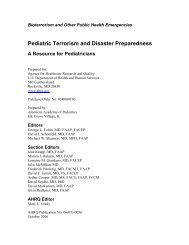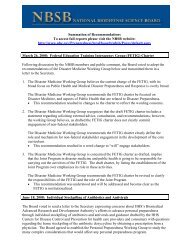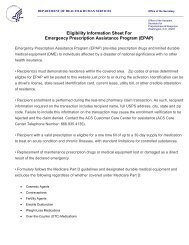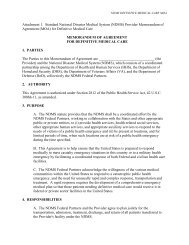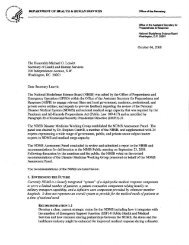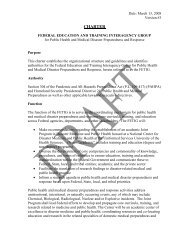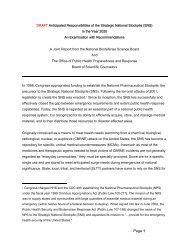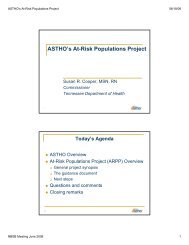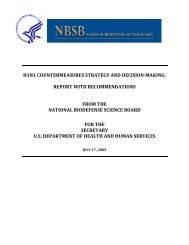(HPP) Performance Measure Manual
(HPP) Performance Measure Manual
(HPP) Performance Measure Manual
Create successful ePaper yourself
Turn your PDF publications into a flip-book with our unique Google optimized e-Paper software.
APPENDIX A<br />
Fatality Management: The ability to coordinate with organizations (e.g., law enforcement, healthcare,<br />
emergency management, and medical examiner or coroner) to ensure the proper recovery, handling,<br />
identification, transportation, tracking, storage, and disposal of human remains and personal effects;<br />
certify cause of death; and facilitate access to mental or behavioral health services for family members,<br />
responders, and survivors of an incident. Coordination also includes the proper and culturally sensitive<br />
storage of human remains during periods of increased death surges.<br />
Hazard Vulnerability Assessment (HVA): A systematic approach to recognizing hazards that may affect<br />
demand for services or the ability to provide those services. The risks associated with each hazard are<br />
analyzed to prioritize planning, mitigation, response, and recovery activities. An HVA serves as a needs<br />
assessment and a strategy to identify those hazards that are most likely to have an impact on a facility<br />
and the surrounding community. The HVA process should involve community partners and be<br />
communicated to community emergency response agencies. (DHHS, 2009).<br />
Healthcare Coalition (HCC): The HCC is a collaborative network of healthcare organizations and their<br />
respective public and private sector response partners that serve as a multiagency coordinating group to<br />
assist with preparedness, response, recovery, and mitigation activities related to healthcare organization<br />
disaster operations. The primary function of the HCC includes sub-state regional, healthcare system<br />
emergency preparedness activities involving the member organizations. This includes planning,<br />
organizing and equipping, training, exercises and evaluation. During response, HCCs should represent<br />
healthcare organizations by providing multi-agency coordination in order to provide advice on decisions<br />
made by incident management regarding information and resource coordination for healthcare<br />
organizations. This includes either a response role as part of a multi-agency coordination group to assist<br />
incident management (area command or unified command) with decisions, or through coordinated plans<br />
to guide decisions regarding healthcare organization support. (Healthcare Preparedness Capabilities)<br />
Healthcare Organization(s) (HCOs): The component(s) of a community's healthcare service delivery<br />
system to primarily include hospitals, Emergency Medical Services (EMS), primary care, long term care ,<br />
mental or behavioral health systems, specialty services (dialysis, pediatrics, woman’s health, standalone<br />
surgery, urgent care, etc.), support services (laboratories, pharmacies, blood banks, poison control, etc.),<br />
private entities associated with healthcare delivery (Hospital associations, regulatory boards, etc.). HCOs<br />
may or may not include components of public health, tribal healthcare, Federal (VA hospitals, IHS<br />
facilities, etc.), community health centers, volunteer medical organizations (e.g. ARC), DOD healthcare,<br />
Healthcare services provided in city, county, or State jails, prisons, penitentiaries and others not noted.<br />
(Healthcare Preparedness Capabilities)<br />
Healthcare Constituencies: The people involved in or served by the HCC.<br />
Healthcare Recovery: Locally-led recovery efforts in the restoration of the public health, health care and<br />
social services networks to promote the resilience, health and well-being of affected individuals and<br />
communities (adapted from<br />
http://www.fema.gov/pdf/recoveryframework/health_social_services_rsf.pdf) .<br />
Healthcare System or Healthcare Service Delivery System: A collection of a community’s healthcare<br />
organizations. (Healthcare Preparedness Capabilities)<br />
Healthcare Workers’ Families: Family members of healthcare workers who may benefit from prophylaxis<br />
or treatment theoretically allowing the worker to remain on duty rather than having to care for ill family<br />
members.<br />
Incident Command Structure (ICS): The Incident Command System (ICS) is a standardized, on-scene, allhazards<br />
incident management approach that allows for the integration of facilities, equipment,<br />
personnel, procedures and communications operating within a common organizational structure, Enables<br />
Hospital Preparedness Program (<strong>HPP</strong>) <strong>Performance</strong> <strong>Measure</strong> <strong>Manual</strong><br />
Guidance for Using the New <strong>HPP</strong> <strong>Performance</strong> <strong>Measure</strong>s Page | 58




